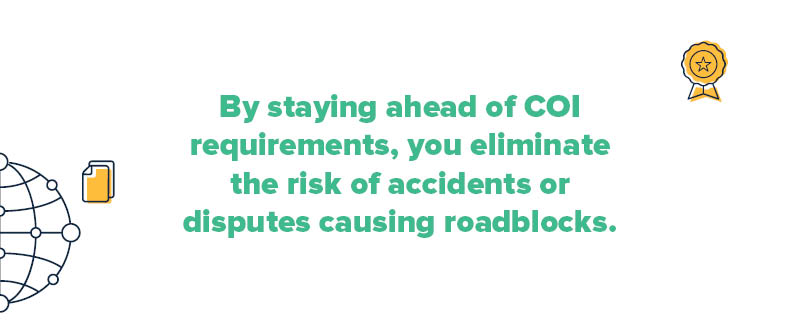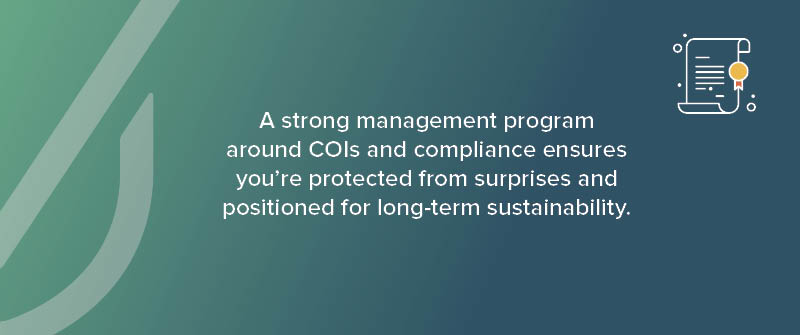
When you’re focused on building a successful business as a third-party vendor, subcontractor, or business owner, insurance compliance might not be your top priority. Yet, how you manage your Certificates of Insurance (COIs) plays a critical role in shaping your reputation, earning trust, and unlocking future opportunities. COI management isn’t just a paperwork exercise; it’s a chance to demonstrate your professionalism, mitigate risk, and solidify your position as a dependable partner.
Whether you’re a business owner, vendor, subcontractor, or part of a broader business network, effective COI management is essential. Across industries like construction, property management, and service-based businesses, prioritizing compliance empowers you to build strong third-party relationships and thrive in competitive markets.
The Growing Importance of Third-Party Insurance Compliance
For third-party service providers, subcontractors, or tenants, COIs are a must-have in contracts with your business partners. They serve as proof that you have proper insurance coverage to protect against risks such as property damage, workplace accidents, or professional errors in your services. Simply put, COIs help ensure there are no surprises–be it financial losses, regulatory compliance disputes, or operational setbacks.
When COI management is overlooked, you may face mounting risks. Missing certificates or non-compliant coverage could result in costly project delays, strained relationships, or even legal troubles. However, when you take control of your COIs, you actively mitigate risk, reassure your clients, and position yourself as a dependable and organized partner within your broader risk management strategy.
Why Vendors Need to Prioritize COI Management and Insurance Compliance
1. Build Trust and Credibility
Providing accurate, promptly delivered COIs sends a message that you’re organized, reliable, and professional. It demonstrates that you take compliance seriously, earning the trust of clients and external partners who want to work with dependable teams.
By managing COIs effectively, you distinguish yourself from competitors who might overlook this critical aspect, showing that you’re prepared to meet industry standards and exceed expectations—especially when undergoing third party risk assessments or supplier risk assessments.
2. Minimize Risks and Operational Disruptions
Imagine the inconvenience a lapsed insurance policy or missing certificate could cause during a key project. At best, it delays work; at worst, it could result in penalties or contract termination. These disruptions can hurt your operations, payment for services, and your professional relationships.
By staying ahead of COI requirements, you eliminate the risk of accidents or disputes causing roadblocks. Proactively managing compliance fosters smoother workflows and ensures your focus remains on delivering high-quality products or services while reducing your cybersecurity risk and protecting sensitive data from exposure during operations.

3. Gain a Competitive Edge in the Market
Strong COI management doesn’t just keep you organized; it elevates your business above others who may not prioritize compliance. Clients and partners appreciate working with businesses that make transactions seamless and reduce complexity.
By demonstrating diligence in your documentation and submission processes, you establish yourself as a standout professional. Over time, this reputation can open doors to new opportunities, strengthen existing relationships, and position you for sustained growth—even among low risk suppliers who still benefit from proper protocols and ongoing monitoring.
Tips to Simplify COI Management
There’s no denying that managing COIs can be tedious without the right strategies in place. However, adopting tools and best practices can help streamline compliance and make the process more efficient.
1. Leverage Technology and AI for Seamless Compliance
The days of manually tracking COIs are over. Automated platforms designed for COI management can save you time and reduce errors. Many now include AI capabilities that take efficiency a step further. These tools allow you to:
- Store documents securely and accessibly, ensuring partners can retrieve them without hassle.
- Receive timely renewal alerts, often driven by AI that predicts renewal windows based on vendor behavior.
- Track compliance in real time, with intelligent dashboards that surface gaps or risks before they become issues.
- Use AI to extract and validate key data from uploaded certificates, reducing the need for manual entry or review.
By integrating technology—and especially AI into your COI processes—into your operations, you can focus on scaling your business while ensuring your compliance processes remain reliable and stress-free. It’s a win for both your internal workflows and your broader vendor risk management approach.
2. Communicate Clearly and Proactively
Transparency is the foundation of successful relationships. When entering a new project or partnership, be proactive in understanding the specific COI requirements upfront. Clear communication ensures that no mismatched expectations arise down the line.
Once the details are clear, ensure your COIs align with the necessary terms and deliver them promptly. These small yet crucial actions reinforce your reliability and professionalism in the eyes of your partners. It also makes contract negotiation smoother when you’re negotiating strong contracts with new collaborators.
3. Understand Basic Coverage Requirements
While you don’t need to be an expert in insurance, having a basic grasp of coverage types like general liability, professional liability, and workers’ compensation can strengthen your ability to meet requirements.
If you’re unsure, many compliance platforms provide user-friendly guidance to help you understand complex policies with ease. Staying informed helps prevent misunderstandings and ensures you remain confident in discussions about coverage, even when discussing the impact of third party data breaches or how to assess risks tied to emerging threats.
4. Treat COI Management as a Business Strategy
Rather than seeing COI management as a task, view it as a core part of your growth strategy. Striving for excellence in compliance showcases your commitment to professional standards. Over time, consistent attention to detail builds trust, increasing the likelihood of repeat business and long-term contracts.
When you treat compliance as more than a box to check, you position yourself as an industry leader––someone partners want to work with again and again. A strong management program around COIs and compliance ensures you’re protected from surprises and positioned for long-term sustainability.

A Proactive Approach Sets You Apart
Prioritizing COI management is about more than avoiding complications; it’s about laying the foundation for trust, efficiency, and growth. Regardless of the industry you’re in, ensuring compliance demonstrates your commitment to collaboration and excellence.
Simplifying COI processes doesn’t just protect your business–it elevates it. By streamlining workflows, communicating proactively, and leveraging technology, you’ll gain a reputation not only for professionalism but also for reliability.
The opportunities ahead are vast, but they favor those who are prepared. Invest in proactive COI management today and equip your business to succeed tomorrow. With diligence and readiness, you can protect your operations, build stronger partnerships, and create a foundation for lasting success. Trust starts here–and so does growth. Contact myCOI today!